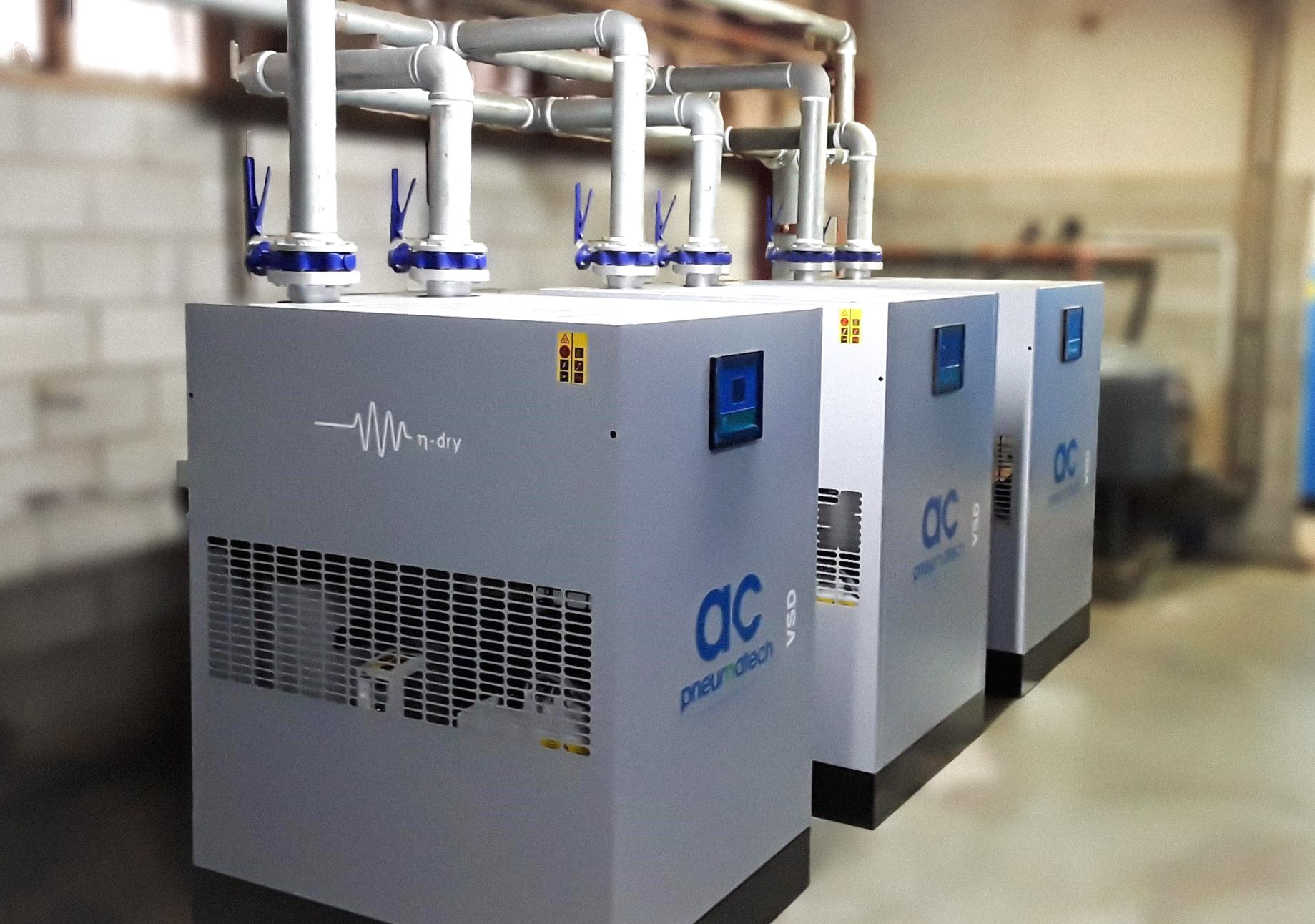Proportioning the Compressed Air Dryer
Trying to figure out which air dryer capacity is best for you? Here are some factors to consider. Read More…
 Compressed
air treatment is a method that dehumidifies and cleans after it leaves the air compressor. This is done using an air dryer and an additional
filter beyond the air filter found in a compressor. Air is always contaminated with solid particles such as dust, sand, soot, salt crystals
and water as it leaves the compressor. An effective compressed air treatment system lowers the dew point of the air and takes out the
elements that may harm equipment downstream of the compressor and dryer. Remember the higher the ambient temperature is, the higher the
ability to hold moisture. Water contamination can also lead to microbial contamination, corrosion, blocked or frozen valves, cylinders, air
motors and tools and premature wear/failure of equipment. Water contamination of compressed air systems can reduce production efficiency and
increase manufacturing costs.
Compressed
air treatment is a method that dehumidifies and cleans after it leaves the air compressor. This is done using an air dryer and an additional
filter beyond the air filter found in a compressor. Air is always contaminated with solid particles such as dust, sand, soot, salt crystals
and water as it leaves the compressor. An effective compressed air treatment system lowers the dew point of the air and takes out the
elements that may harm equipment downstream of the compressor and dryer. Remember the higher the ambient temperature is, the higher the
ability to hold moisture. Water contamination can also lead to microbial contamination, corrosion, blocked or frozen valves, cylinders, air
motors and tools and premature wear/failure of equipment. Water contamination of compressed air systems can reduce production efficiency and
increase manufacturing costs.
 Both
refrigerated and desiccant dryers are needed in many industrial applications to produce/protect final products, as well as to protect much
of the pneumatic equipment that is used in many industrial facilities. Food/beverage packaging and manufacturing companies use dryers to
prevent their actuators and assembly machinery from rusting or collecting moisture in the lines that prevents clean compressed air from
flowing. Dryers are also used in textiles to keep fabrics free of moisture and to aid in the texture of produced products. Many electronics
manufacturers need high levels of dry air so that humidity will not transfer over to the production of computers, cell phones, televisions,
etc. These same industries often use moisture separators, oil-water separators and aftercoolers to further aid in the drying process, as
well as removal of contaminants from any compressed air flow. Dust, dirt or other small particles are present in compressed air until they
are removed by using filters, separators and mist eliminators. Air treatment is necessary in almost all compressed air applications. From
food manufacturing, to brewing beer, to building electronics, having dry compressed air is a must to prevent product and equipment damage.
Both
refrigerated and desiccant dryers are needed in many industrial applications to produce/protect final products, as well as to protect much
of the pneumatic equipment that is used in many industrial facilities. Food/beverage packaging and manufacturing companies use dryers to
prevent their actuators and assembly machinery from rusting or collecting moisture in the lines that prevents clean compressed air from
flowing. Dryers are also used in textiles to keep fabrics free of moisture and to aid in the texture of produced products. Many electronics
manufacturers need high levels of dry air so that humidity will not transfer over to the production of computers, cell phones, televisions,
etc. These same industries often use moisture separators, oil-water separators and aftercoolers to further aid in the drying process, as
well as removal of contaminants from any compressed air flow. Dust, dirt or other small particles are present in compressed air until they
are removed by using filters, separators and mist eliminators. Air treatment is necessary in almost all compressed air applications. From
food manufacturing, to brewing beer, to building electronics, having dry compressed air is a must to prevent product and equipment damage.
If you have any questions on setting up air treatment or sizing your next dryer, please contact us.

Ash Air has been around in New Zealand since 1979, and we’ve grown into a nationwide company with international support and a
reputation for quality and reliability.We look after all things compressed air for your business!
Ash Air's range of Chicago Pneumatic, Alup, Pneumatech, and Quincy compressors are used extensively around the world in industries
ranging from oil and gas to food, automotive and farming, and we bring you these world class compressors here in the land of the long white
cloud.Our technicians are compressed air equipment experts and are dedicated to addressing customer needs. Supported by a 13 locations
nationwide, Ash Air offers one of the widest selections of compressed air equipment and parts available today in New Zealand.
With Ash Air compressors, you can count on reliability and high performance for even the most demanding applications. We focus our
efforts on the following:
Talk to the team today:
Proportioning the Compressed Air Dryer
Trying to figure out which air dryer capacity is best for you? Here are some factors to consider.
Read More…
Maintenance budget: 8 factors to consider
Just like any other equipment, a compressed air installation also requires the necessary maintenance work during its entire
lifespan. Even though maintenance costs are only about 5 to 10% of a machine's annual operating costs, failure to budget for
maintenance can have potentially disastrous consequences.
Read More…
The air dyer is one of the most ignored cooler in the system. A dirty condenser will cause water in the lines, or worse it will cause
complete dryer failure.
Read More…
Do you have an idea for our #expertcorner? Let
us know!

Who we are and how Ash Air can help your business!
Reliability and Efficiency
Read more from our #expertcorner